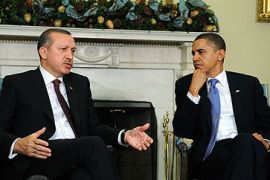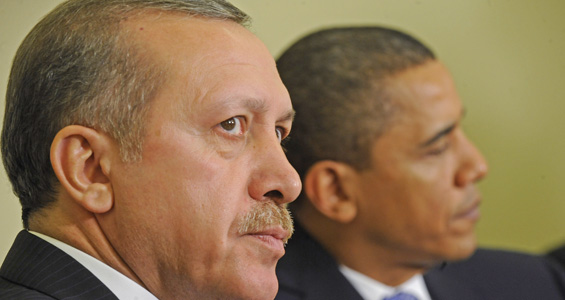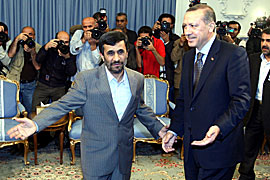Turkey differs with US over Iran
Ankara may have to choose between Tehran or its partnership with Washington.

 |
| Obama has made Turkey a strategic ally in the Middle East, but can Erdogan afford to turn away from strong economic ties with Iran? [EPA] |
The month of December is turning out to be crunch time for Barack Obama, the US president, as four of the key issues which have marked his presidency – Afghanistan, Iran, healthcare reform, and climate change – will have reached a critical stage in the weeks before Christmas.
Last week, Obama laid out a new strategy for Afghanistan, hosted a jobs summit, and made a pitch to Democratic senators to pass his healthcare reform legislation.
Next, he will give a major speech on the economy, and zip over to Oslo, Norway to pick up his Nobel Peace Prize (the irony of receiving the prize a week after ordering 30,000 new troops to fight the Taliban has been lost on no one in Washington).
Then he will travel to Copenhagen, Denmark for the global climate change summit. The senate is trying to pass healthcare reform before Obama takes off for a holiday in Hawaii.
The Turkish equation
But first, time for Turkey. Recep Tayyip Erdogan, the Turkish prime minister, visited the White House for a one-on-one sit-down with Obama on Monday. On the agenda: Afghanistan, Iran, and Iraq.
Obama has made relations with Turkey a priority. He visited Ankara and Istanbul on his first trip abroad as president, and made a speech signalling his new outreach to the Muslim word – a theme he later expanded upon in Cairo.
Turkey’s strategic significance as a country that borders the European Union, Syria, Iraq, the Caucasus, and Iran cannot be overstated. US-Turkish relations plummeted to dismal lows while George Bush was in the White House, but Obama is intent on repairing ties.
The White House also believes that the US will benefit by demonstrating a healthy relationship with a Muslim country ruled by Erdogan’s mildly Islamist government. “I am pleased that America can call Turkey a friend, and I’m pleased that I’m able to call Prime Minister Erdogan personally a friend,” Obama said after the meeting.
Erdogan said the US and Turkey have a “model partnership”.
Strategic disagreements
 |
| Erdogan, right, has cemented strong ties with Iran’s Ahmadinejad, left [EPA] |
Nevertheless, there are significant strategic disagreements. Obama would like the Turks, who have Nato’s second-largest army, to send more troops to Afghanistan.
But Erdogan has consistently refused to send combat forces, instead keeping the 1,750 Turkish troops already there confined to a non-combat role.
Obama appears not to have pressed the issue with an outright demand for more troops. In his public remarks after the meeting he referred only to Turkey’s “outstanding contributions to stabilising Afghanistan”.
On Iran, “Turkey and the United States have not been on the same wavelength,” says analyst Bulent Aliriza of the Centre for Strategic and International Studies.
Obama has hardened his stance in the face of Iranian intransigence over the nuclear issue and is likely to seek harsher UN sanctions soon.
Erdogan has been building closer economic ties and diplomatic relations with Tehran. Turkey is one of Iran’s major economic partners, with $10bn in bilateral trade annually. If Obama succeeds in tightening the economic stranglehold around Iran, it will hurt Turkey economically.
Turkey is also a non-permanent member of the UN Security Council, which would have to approve new sanctions.
The leaders appear to have kicked the Iranian can down the road; in their public remarks, Erdogan did not even mention Iran, while Obama merely said Turkey will be an “important player” in trying to nudge Iran away from what the West believes is a drive to acquire nuclear weapons.
But some time in the next few weeks, Turkey may have to choose between its Nato ally and its major trading partner – a decision which may strain relations and complicate Obama’s December even more.